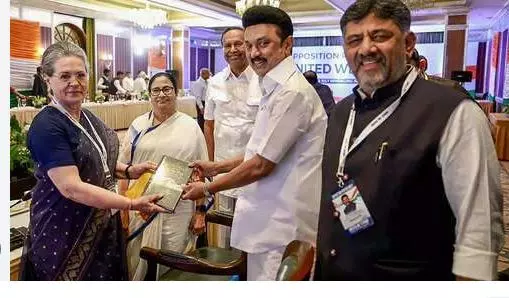
Ahead of a grand opposition meeting, leaders gather for Siddaramaiah’s dinner
text_fieldsBengaluru: Top leaders from various opposition parties gathered in Bengaluru on Monday for an informal meeting and dinner ahead of the Opposition unity meeting scheduled for Tuesday.
The meeting, expected to be attended by representatives from 26 parties, aimed to discuss the formation of a proposed anti-BJP grouping, including aspects such as a name, structure, common agenda, campaign program, and a roadmap for seat-sharing.
While camaraderie filled the air at the informal meeting, the absence of NCP chief Sharad Pawar raised concerns. Pawar, who skipped Monday's talks, had promised to attend the meeting on Tuesday. However, his ongoing meetings with NCP rebels who have joined the BJP added an air of uncertainty.
The dinner hosted by Karnataka Chief Minister Siddaramaiah brought together unlikely foursomes, including UPA chairperson Sonia Gandhi, Trinamool Congress chief Mamata Banerjee, Aam Aadmi Party (AAP) supremo Arvind Kejriwal, and Congress President Mallikarjun Kharge. The presence of these leaders fostered an atmosphere of collaboration and raised hopes of resolving tensions between Congress and TMC in West Bengal.
At the previous Opposition unity meeting in Patna, tensions flared between Congress leaders and Arvind Kejriwal. However, the Congress's promise to oppose a recent ordinance curbing the powers of the AAP government in Delhi seemed to have alleviated the friction. Sonia Gandhi's presence in Bengaluru was expected to further smoothen the process, given her warm ties with leaders across parties.
During the informal talks, Congress leader Mallikarjun Kharge read out the agenda for the meeting, which encompassed crucial proposals. These included the establishment of subcommittees to draft a common agenda and communication points, the formulation of a joint program for parties involving rallies, conventions, and agitations, seat-sharing arrangements on a state-by-state basis, the selection of a name for the alliance, the creation of a common secretariat, and discussions on electoral reforms and Electronic Voting Machines (EVMs).
One senior leader anticipated major announcements on Tuesday, suggesting that the alliance might adopt a new name by the afternoon. However, Congress delivered a reality check, acknowledging that seat-sharing arrangements would likely require more time. Despite this, the Opposition meeting was deemed a potential game-changer in Indian politics, offering solutions to the common people's issues through a united front.
While differences were expected to emerge, with CPI(M) ruling out an alliance with the TMC in West Bengal, the Left leaders stressed the importance of a common program centred around safeguarding democracy, the Constitution, and secularism. The TMC preferred the framework to focus on common issues and talking points rather than using the term "common minimum program" from the Left's vocabulary.
Notable figures present at the informal talks and dinner included Rahul Gandhi, M K Stalin, Akhilesh Yadav, Lalu Prasad, and Nitish Kumar. The leaders emphasized their commitment to work together closely, aiming to promote social justice, inclusive development, and national welfare, ultimately liberating the people of India from what they perceived as an autocratic and anti-people political climate characterized by hate, division, economic inequality, and corruption.
AICC General Secretary (Organisation) K V Venugopal addressed the press, acknowledging the need to resolve the various issues faced by the 26 political parties involved. He emphasized that decisions regarding a new name or continuation with the UPA would be made through discussions in subsequent meetings. Seat-sharing arrangements and strategies for a one-on-one contest against the BJP would also require further deliberation and time.























